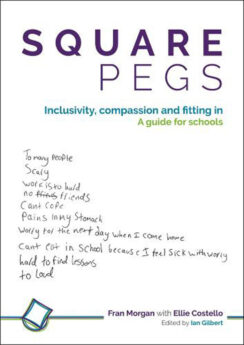Publisher
Independent Thinking Press
ISBN 10
1781354103
Published
2 Feb 2023
With all the buzz around it, it was evident that the premise of this book was resonating with teachers in a big way. The title and concept spoke deeply to me, and I was clearly not alone. Before it was even available to read, Square Pegs had allegedly already gone into its second print run.
The book starts with three pages of glowing praise from filmmakers, professors of education, a former commissioner of London schools and more, setting a high bar of expectation. This comprehensive guide to inclusion features 38 chapters from 53 contributors with a diverse array of perspectives and experiences.
As a teacher, I can get defensive when faced with a critique of the profession and this book certainly doesn’t shy away from that. However, I made a conscious decision to leave my teacher hat at the door and to give the book a fair shot.
While there were certainly critiques of the system within its pages, Square Pegs forced me to think deeply about the children of its eponymous title and their schooling experience. The first-hand accounts throughout the book are truly moving, and it’s impossible not to feel compassion for students who have faced such challenges.
But while the variety of voices and stories is one of the book’s strengths, it is also one of its key limitations. With 53 different perspectives, some of which offer contradictory views and others that repeat what has already been covered, the book at times left me feeling a bit muddled, wondering which viewpoint was the most valid or credible and whether repetition lent certain arguments more weight.
Its scattergun approach does encourage you to form your own opinions
To be generous to it, this scattergun approach does get you thinking and encourages you to form your own opinions. But while showcasing so many voices lends the book some weight, I can’t help but feel that it’s lost without a clear sense of where and how to apply it. A more coherent and aligned set of views would have allowed for a clearer and more impactful message.
What the diverse voices do particularly well is to offer a glimpse into the many challenges faced by educators and schools when it comes to inclusivity and compassion. Several chapters genuinely touched me and made me reconsider my own views. One in particular, ‘The Dreams List by Dave McPartlin, is so powerful that I actually cried. I dare anyone to read it and not be moved. McPartlin’s approach to nurturing his students’ self-belief and ambition is truly inspiring and it made me reflect on the type of educator I want to be.
Over and above this emotive aspect, which one might expect from a book on compassion, there are also many innovative and outside-the-box ideas for supporting “square peg students”. However, the authors don’t always take into account ever-shrinking school budgets. One chapter even states explicitly that “it is not about the money”. For many schools today, the sad reality is that it very much is.
I would have liked Square Pegs to offer more solutions to help schools work within the very real constraints they have. Nevertheless, it still offers valuable insights and inspiration. It shows how important supporting students who are often misunderstood, overlooked and marginalised because they do not fit the mould and demonstrates that providing supportive and inclusive environments can give them the chance to thrive and be proud of who they are, benefiting them and the entire school community.
Reading this book reinforced in me how essential it is that we prioritise supporting our ‘square pegs’ and work towards a more inclusive and equitable education system. More than that, it’s a valuable resource with a host of insightful and empowering perspectives on the experiences and challenges faced by these students.
The editors have done an excellent job of curating experiences, personal stories and expert insights that make their book a must-read for anyone seeking to understand, appreciate and nourish the unique qualities that make each student special.
You won’t find unifying theme or a single set of solutions here, but on reflection that’s probably exactly the point.













Your thoughts